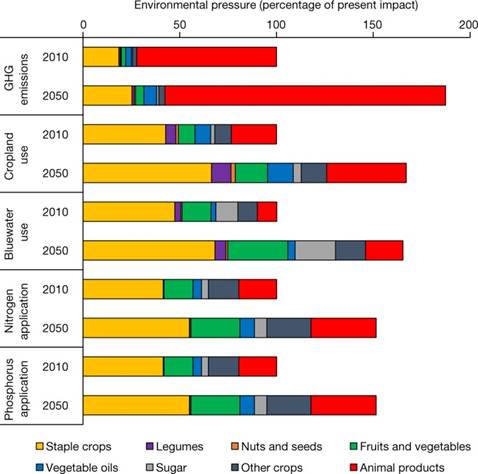研究呼吁采取行动缓解粮食生产对环境不利影响

英国一项新研究警告说,如果全球不采取行动提升农业生产水平、改变粮食消费方式,到2050年粮食系统对环境的不利影响可能上升50%至90%。
英国牛津大学研究人员领衔的一个国际研究团队利用大量数据建立了一个全球粮食系统模型,用于跟踪全球粮食生产与消费,并分析与粮食相关的环境影响。研究报告刊登在新一期英国《自然》杂志上。
粮食系统对环境有很大影响。比如,粮食生产排放了全球近四分之一的温室气体、占用近三分之二的淡水资源,减少森林面积并破坏生物多样性,使用化肥和农药还会造成氮、磷污染。研究团队基于未来粮食需求,用新的数学模型将2010年至2050年间与粮食相关的环境影响进行了量化分析。
报告主要作者、牛津大学的马尔科·施普林曼说,如果不采取行动,那么到2050年,人口增长以及高脂高糖饮食、肉类食物的消费增加将使粮食系统对环境的不利影响上升50%至90%,“与粮食生产相关的地球承载能力极限将被打破”。
研究团队分析了几种缓解粮食系统对环境影响的措施,如推广更健康的植物性饮食、提高农业生产技术和管理水平、减少粮食损失和浪费等。他们认为,如果综合运用这些措施,到2050年,许多预期会增加的环境压力或许能得到缓解。
施普林曼说,单独推行任何一种措施都不足以缓解粮食系统给地球环境带来的压力,但如果将它们综合使用,还是有可能改善粮食供应的可持续性。(来源:新华社 张家伟)
Options for keeping the food system within environmental limits
Abstract The food system is a major driver of climate change, changes in land use, depletion of freshwater resources, and pollution of aquatic and terrestrial ecosystems through excessive nitrogen and phosphorus inputs. Here we show that between 2010 and 2050, as a result of expected changes in population and income levels, the environmental effects of the food system could increase by 50–90% in the absence of technological changes and dedicated mitigation measures, reaching levels that are beyond the planetary boundaries that define a safe operating space for humanity. We analyse several options for reducing the environmental effects of the food system, including dietary changes towards healthier, more plant-based diets, improvements in technologies and management, and reductions in food loss and waste. We find that no single measure is enough to keep these effects within all planetary boundaries simultaneously, and that a synergistic combination of measures will be needed to sufficiently mitigate the projected increase in environmental pressures.
原文链接:https://www.nature.com/articles/s41586-018-0594-0.pdf

